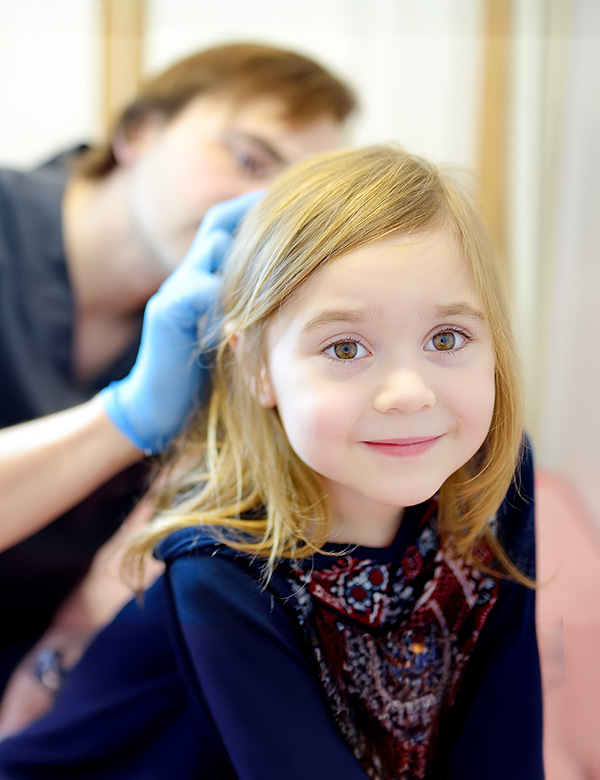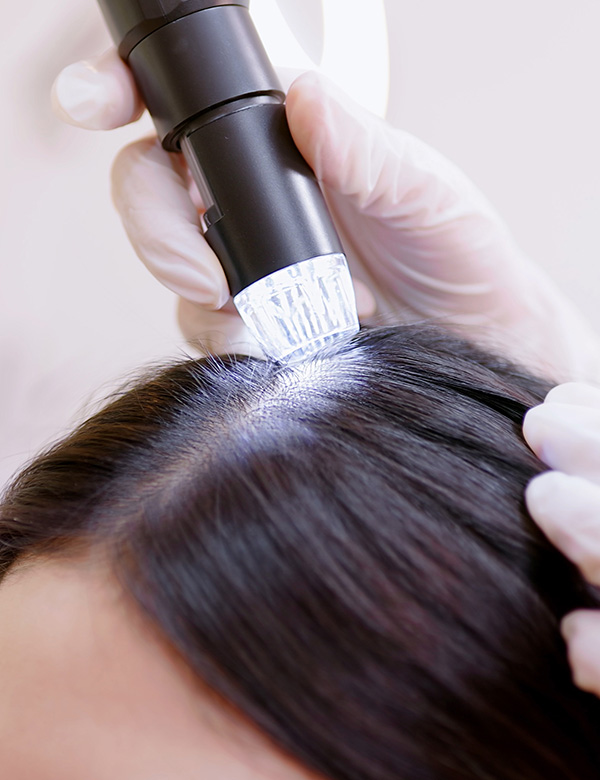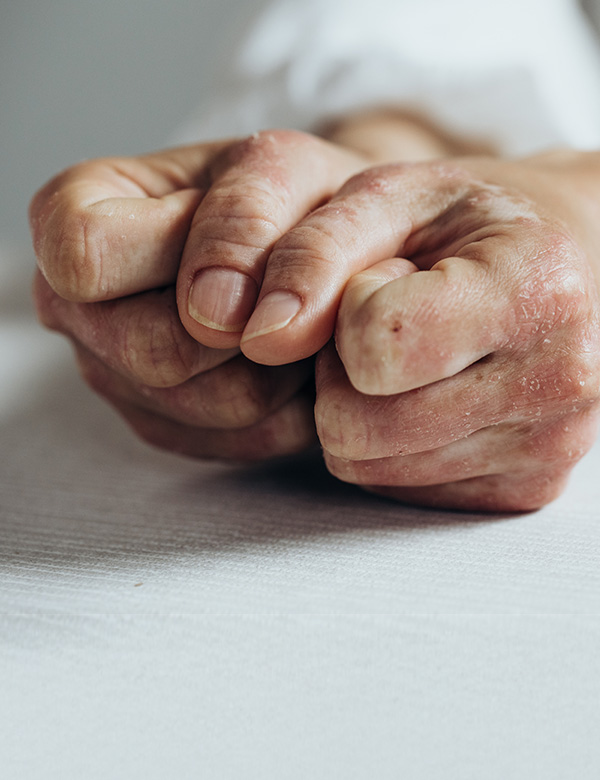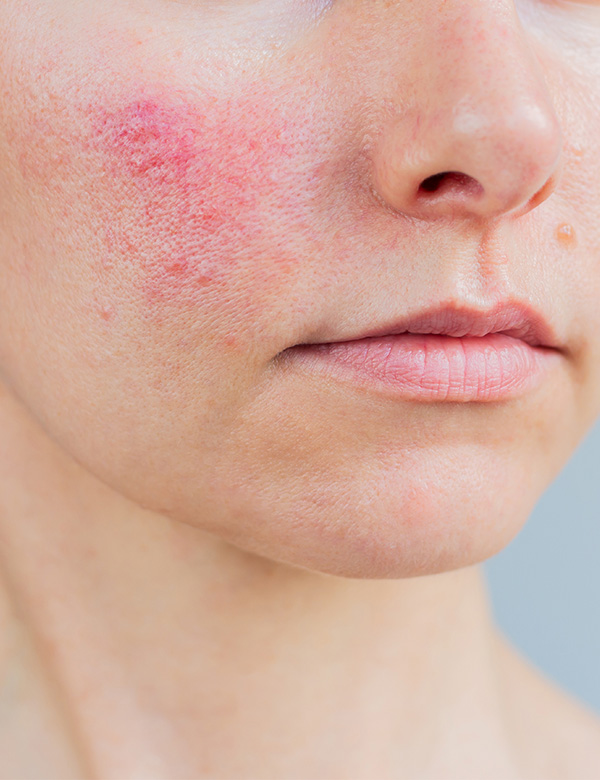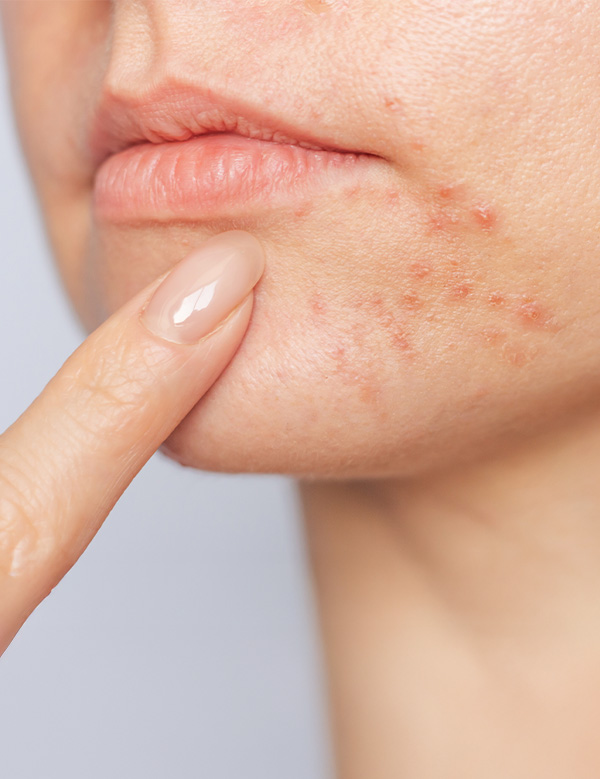Scarring Hair Loss
Scarring hair loss: Shiny, itchy, bald patches on the scalp – get diagnosed and treated by an experienced dermatologist at Derma Medical Clinic Zurich - Sihlcity
Scarring Hair Loss
Chronische Abszesse und schmerzhafte Knoten durch erfahrenen Hautarzt abklären und behandeln in der Derma Medical Clinic in Zürich - Sihlcity
Itchy, red and shiny bald patches on the scalp – identify and treat hair loss with scarring, a rare hair condition, in our specialized hair consultation.
Examinations
Scalp examination
Hair analysis
Blood test
Skin biopsy if needed
Process
Duration
between 20 and 30 minutes
What Is Scarring Hair Loss?
Scarring hair loss – medically known as cicatricial alopecia – is a special form of hair loss where the hair roots can be permanently damaged by inflammation.
As a result, no new hair grows in the affected areas, leaving behind bald spots with changed skin that often appears shiny or red.
Unlike patchy or sudden hair loss, this condition is usually caused by an inflammatory disease of the scalp. That’s why it’s important to find out early whether you have scarring alopecia and stop the inflammation as soon as possible.
A check-up is worthwhile if you…
- have bald patches on your scalp where no new hair has grown for a long time
- notice symptoms like itching, redness, or burning in those areas
- see that the skin looks shiny, scarred, or scaly
- are unsure if your hair loss is caused by an inflammatory scalp disease
- feel your hair loss is slowly getting worse and doesn’t stop
- already have an autoimmune disease and also experience hair loss

What Is Scarring Hair Loss?
Scarring hair loss – medically known as cicatricial alopecia – is a special form of hair loss where the hair roots can be permanently damaged by inflammation.
As a result, no new hair grows in the affected areas, leaving behind bald spots with changed skin that often appears shiny or red.
Unlike patchy or sudden hair loss, this condition is usually caused by an inflammatory disease of the scalp. That’s why it’s important to find out early whether you have scarring alopecia and stop the inflammation as soon as possible.
Who Should Get Checked for Hair Loss?
A check-up is worthwhile if you…
- have bald patches on your scalp where no new hair has grown for a long time
- notice symptoms like itching, redness, or burning in those areas
- see that the skin looks shiny, scarred, or scaly
- are unsure if your hair loss is caused by an inflammatory scalp disease
- feel your hair loss is slowly getting worse and doesn’t stop
- already have an autoimmune disease and also experience hair loss
Treatment
The affected areas are carefully examined using a scalp analysis with magnification.
If scarring alopecia is suspected, we take a blood sample and, in some cases, a small skin biopsy to confirm the diagnosis.
What treatment options are available for scarring hair loss?
Depending on the case, we use anti-inflammatory creams, solutions, tablets, or injections.
What Does the Diagnostic Process Involve?
First consultation
At your first visit, we’ll talk about how your hair loss has developed, any family history, and possible triggers.
Scalp examination
We examine the affected areas closely, and if needed, take pictures to analyze hair density and structure.
If needed: Blood test and skin sample
A blood test or a small skin sample (biopsy) may be necessary to confirm the diagnosis.
Treatment & follow-up
Treatment may include anti-inflammatory products like creams, tablets, or injections. We will regularly check how well the therapy is working.

At Derma Medical Clinic, hair loss diagnosis and treatment are provided by Dr. Markus Dendorfer, specialist in dermatology.
He has many years of experience in the diagnosis and treatment of hair conditions in women, men, and children.

Dr. med. Benjamin Miller
Board-certified Specialist in Dermatology & Venereology FMH

Dr. med. Markus Dendorfer
Board-certified Specialist in Dermatology & Venereology FMH
What You Can Expect from Us
Specialized hair consultation
Our hair specialist has many years of experience diagnosing different types of hair loss in women, men, and children.
Child-friendly diagnosis & support
We approach children with care, explain things in an age-appropriate way, and guide families clearly and kindly through the process.
Hair analysis
We combine expert assessments with modern technology: a computer-based test measures hair density, thickness, and growth in a small area of the scalp.
Everything under one roof
You’ll receive diagnosis, medical treatment, and cosmetic support all in one place. This means fixed contacts, short paths, and a coordinated approach from your first consultation through to follow-up.
Do you notice bald patches that shine, itch, or feel different – and hair doesn’t grow back there?
Book your appointment now for a scarring hair loss assessment at the specialized hair consultation of Derma Medical Clinic in Zurich - Sihlcity.
FAQ – Frequently Asked Questions about Scarring Hair Loss
What is scarring alopecia?
Scarring alopecia – also called cicatricial hair loss – is a condition where hair roots are permanently destroyed by inflammation. Scar tissue forms in the affected areas, so no new hair can grow.
How can I recognize scarring alopecia?
Typical signs are bald patches that look smooth, shiny, or scarred. The pores are often no longer visible. You may also feel itching, burning, or tightness. It usually develops slowly.
What causes scarring hair loss?
It’s often caused by chronic inflammation of the scalp – for example in conditions like lichen planopilaris, frontal fibrosing alopecia, or lupus erythematosus. Infections, injury, or autoimmune reactions can also trigger it.
Is scarring hair loss curable?
Once scarring has occurred, the bald spots usually don’t regrow hair. Treatment aims to slow down the inflammation and stop further hair loss. The earlier the diagnosis, the better the chances of halting its progress.
How is scarring alopecia diagnosed?
Diagnosis involves a dermatological exam, usually combined with a scalp analysis using magnification (trichoscopy), and if necessary, a skin biopsy for a close look.
What treatment options exist?
Depending on the type and stage, treatment may involve anti-inflammatory creams, solutions, or tablets – such as cortisone or medications that regulate the immune system. Supportive scalp care products can also help.
Can hair grow back in bald areas?
In scarred areas, hair generally doesn’t grow back because the roots are already damaged. But treatment can slow hair loss in nearby areas where hair roots are still healthy.
Does a hair transplant help with scarring alopecia?
In most cases, transplants are not an option because scarred scalp tissue doesn’t support new hair growth. Whether an exception applies depends on individual findings and needs to be discussed in a specialized center.
When should I see a dermatologist about hair loss?
If you notice bald patches that don’t go away, especially if the skin there looks different or causes discomfort. The sooner the cause is found, the better chance to stop the inflammation.
